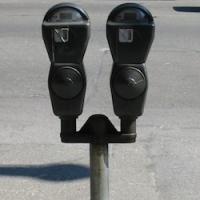Reinventing (and Testing) the Parking Meter

Nearly eighty years ago, streetscapes of cities and towns started changing as a new technology was adopted, with the introduction of parking meters in Oklahoma. Many of these are now being upgraded in various ways, with varying levels of success, and with many variations in business rules.
In some places, like Shamokin, PA, the old coin meters are just being swapped for new ones (with increased prices). In other places, new meters are using credit cards, smart cards, Wi-Fi, in-road sensors, solar power, and even satellite positioning technology. The new Oklahoma multispace meters use solar power and accept credit cards but still use paper tickets for the dashboard. They are not cutting edge but are driver friendly, as they allow drivers to park in different spaces while time remains on their ticket. On one side of Los Angeles, they are celebrating removing meters while adding them elsewhere.
In Santa Monica, the new meters are typical of many being installed across the country, using ground sensors and accepting coins, credit cards, and even smartphone payments. Meters can even send a text message when time is about to expire. On the downside, extra time is cleared as soon as a car moves and can't be topped up once the time expires. On the upside, California law has just changed to allow drivers to park at an out-of-order meter.
This won't help Denise Barton, who claims the working meters are affecting her health and is suing for $1.7 billion in damages.
It would have helped Anna Arenson in Toronto. She was fined $31 for parking next to a broken meter during a blizzard, which was then turned into a class action suit that has been lost, leaving her with a bill of $70,000. The meter was supposed to send a signal to the parking authority to turn the meter off, but this didn't happen. Another unique Canadian problem is the introduction of new coins, requiring meter reconfiguration, including dropping each new coin into each meter at least twenty times!
A meter pilot in Newhaven, CT, attracted nationwide attention with the clearing of remaining time when a car leaves. Denver authorities also tested this in their system but only to “verify functionality” and stated, “There is no plan in place that would turn on this function as part of the next phase of testing.” In Syracuse, NY, they are making extra money clearing the time, but the secondhand meters bought only a few years ago are having major reliability problems. In Reno, NV, they are losing money with their new meters, suffering blank screens, unresponsive keypads, and even bare Microsoft Windows desktops.
In Minneapolis, they have seen a 12 percent jump in parking revenue, but parking officers cannot see expired meters from a distance and have to use a smartphone to access a website, entering the street name and then meter group to see red indicators on the parking spaces. This is very inefficient compared to typical meters, like those in Los Angeles that display red indicators on the meter—though they don't always work.
Some cities are actively trying to assist drivers. In Milwaukee, all meters now have signage directing drivers to a website to help resolve their parking issues online. In Washington, DC, they are holding parking think tanks to discuss driver issues and concerns.
Who has the most novel meters? My vote is for Dover, New Hampshire, where, starting in November, drivers will have a yellow smartcard. When parking, they choose the town and carpark, and then leave the card displayed. Before they drive off, they push a button on the card and are charged by the minute for their stay. If they haven't returned in three hours, the card displays “time expired” and a ticket can be issued.
What are your experiences with smart parking meters? Do you know any strange parking tales? Please add your comments below.

